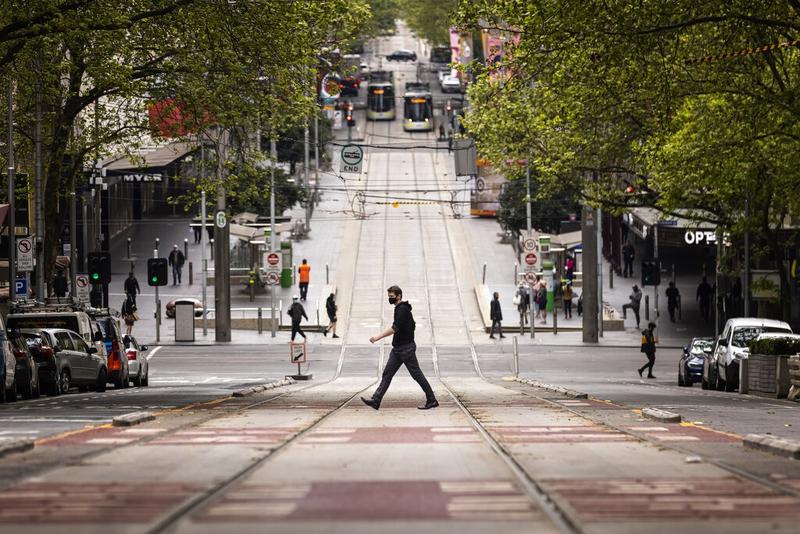 People wearing face masks cross Bourke Street in Melbourne on Sept 30, 2021. (DANIEL POCKETT / AAP IMAGE VIA AP)
People wearing face masks cross Bourke Street in Melbourne on Sept 30, 2021. (DANIEL POCKETT / AAP IMAGE VIA AP)
VIENTIANE / BANGKOK / COLOMBO / SINGAPORE / TEHRAN / ANKARA / RAMALLAH / WELLINGTON / SEOUL / KUALA LUMPUR / IDLIB / ULAN BATOR / NEW DELHI / TOKYO / MANILA / JERUSALEM / JAKARTA / PHNOM PENH / SUVA / HANOI - Australian Prime Minister Scott Morrison on Friday announced an 18-month ban on Australians traveling abroad will be lifted from next month, easing one of the toughest COVID-19 restrictions imposed globally.
Reopening the international border for citizens and permanent residents will be linked to the establishment of home quarantine in Australia's eight states and territories, Morrison said, meaning that some parts of the country will reopen sooner than others.
The first phase of the plan will focus on citizens and permanent residents being allowed to leave Australia, with further changes expected to permit foreign travelers to enter the country.
"It's time to give Australians their lives back. We've saved lives," Morrison said during a televised media conference. "We've saved livelihoods, but we must work together to ensure that Australians can reclaim the lives that they once had in this country."
Citizens and permanent residents have been allowed to return from abroad, subject to quota limits and a mandatory 14-day quarantine period in a hotel at their own expense. There have also been a few high-profile exceptions granted for entry for business purposes, including Hollywood actors to film movies and TV shows.
Morrison said he expects the first home quarantine systems to be up and running in November, but the timetable will be set by individual states and territories.
He has previously said it wants all state and international borders reopened when the national vaccination rate for people aged over 16 reaches 80%, expected by the end of next month.
However, a Delta variant-fuelled outbreak that has locked down the major cities of Sydney, Melbourne and Canberra for weeks has divided state and territory leaders. Some presiding over virus-free parts of the country have indicated they will defy the federal plan.
Under the plan announced on Friday, Australians who are fully vaccinated will be able to travel abroad and complete a 7-day quarantine at home on their return. People who are not vaccinated will be required to undertake 14 days of quarantine at a hotel when they return.
In another development, Australia’s drugs regulator recognized the Coronavac and Covishield coronavirus vaccines, paving the way for overseas travelers who have received those jabs to enter the country.
The Therapeutic Goods Administration has said the vaccines should be considered as “recognized vaccines” to determine incoming international travelers as being vaccinated, Prime Minister Scott Morrison said in a statement Friday.
Cambodia
Cambodia saw a dramatic drop in new COVID-19 cases on Friday as more than 83 percent of the country's total population have received at least one dose of COVID-19 vaccines, according to a Health Ministry's press release.
Cambodia reported 232 new infections, the lowest daily figure since mid-April, according to the press release. Also reported were 17 fatalities and 556 recoveries.
To date, the Southeast Asian nation has logged a total of 112,883 COVID-19 cases with 2,336 deaths and 103,383 recoveries, the ministry said.
The mnistry's secretary of state and spokeswoman, Or Vandine, said as of Sept 30 the kingdom had administered at least one vaccine shot to 13.37 million people, or 83.57 percent of its 16-million population.
Of them, 11.06 million, or 69.12 percent, had been fully vaccinated with both required shots and 894,351, or 5.58 percent, had received a booster dose.
Fiji
Fiji reported 107 new COVID-19 cases and seven deaths on Friday, taking the tally to 51,130 and the death toll to 631.
Permanent Secretary for Health James Fong said there were 68 new recoveries, bringing the number of active cases to 12,859 and the total recoveries to 37,148.
Fong said that so far 592,628 adults have received their first dose of the COVID-19 vaccine and 454,474 have received two doses.
India
The Serum Institute of India, which produces the AstraZeneca COVID-19 vaccine, will resume small exports via the global vaccine-sharing platform COVAX this month and raise it substantially by January, its head told The Telegraph.
"Our exports to COVAX will recommence again in October, initially these supplies will be small but by January 2022, once we have satisfied domestic demands – people forget that India is still a lower-middle income country – we will see large volumes go to COVAX," Chief Executive Adar Poonawalla said.
India's COVID-19 tally on Friday rose to 33,766,707 as 26,727 new confirmed cases were registered in the past 24 hours nationwide, showed data from the federal health ministry.
The ministry also reported 277 more deaths from the pandemic during the cited period, bringing the total death toll to 448,339.
Of the new cases 15,914 and 122 of the new deaths were reported in the southern state of Kerala.
Indonesia
The number of COVID-19 cases in Indonesia rose by 1,624 within one day to 4,216,728, the health ministry said Friday.
The death toll rose by 87 to 142,026, the ministry said.
To date, at least 51.75 million people in the country have received two shots of vaccines while 92.16 million have taken their first dose, the ministry added.
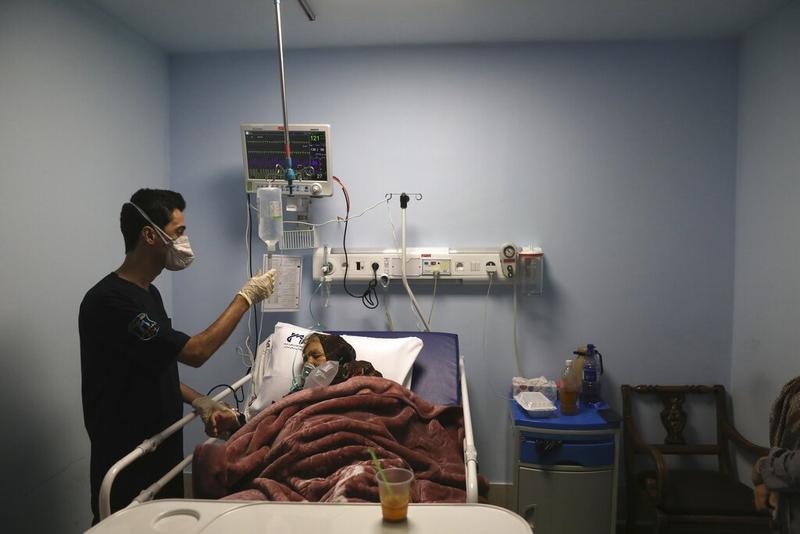 A COVID-19 patient is tended by a nurse at the COVID-19 ICU ward of Amir Al-Momenin hospital in the city of Qom, some 125 km south of the capital Tehran, Iran on Sept 15, 2021. (VAHID SALEMI / AP)
A COVID-19 patient is tended by a nurse at the COVID-19 ICU ward of Amir Al-Momenin hospital in the city of Qom, some 125 km south of the capital Tehran, Iran on Sept 15, 2021. (VAHID SALEMI / AP)
Iran
Iran on Thursday reported 14,078 new COVID-19 cases, taking the country's total infections to 5,587,040
The pandemic has so far claimed 120,428 lives in the country after 268 new deaths were registered in the past 24 hours, said Iran's Ministry of Health and Medical Education.
Israel
Israel's Health Ministry has identified fewer than 10 cases of heart inflammation following a third dose of the Pfizer-BioNtech vaccine among millions administered, according to recently released data.
Israel began administering boosters to risk groups in July and by the end of August expanded its campaign to include anyone above the age of 12, five months or more after a second dose.
Having kicked off its rapid vaccination drive relatively early, in December, Israel was one of the first countries to report that the vaccine's protection diminished with time, and has since deemed its booster campaign safe and effective.
The booster drive is being watched closely in the United States, where third Pfizer shots have been rolled out for those 65 and older, all people at high risk of severe disease, and others who are regularly exposed to the virus.
In data published late on Thursday, the Health Ministry reported nine cases of myocarditis within four age groups that comprised more than 1.5 million people who had received a booster shot.
All were male, three were between the ages of 16 and 29 and six were in the 30-59 group. Eight more possible cases were still being reviewed. Most myocarditis cases are generally mild, the ministry said.
In total, out of all 3.2 million Israelis who have received a third jab, 25 reported serious adverse events that appeared within 30 days of the shot, including myocarditis, though a causal link had yet to be established among many of them.
In another development, Israel plans to replace the existing PCR and antigen tests with saliva tests to detect COVID-19, Israel's state-owned Kan TV news reported on Thursday evening.
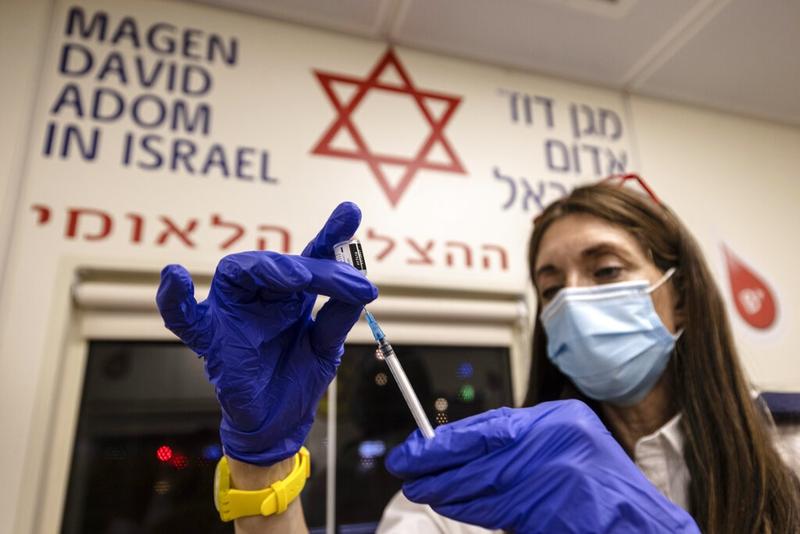 A medic from Israel's Magen David Adom emergency service prepares a booster shot of the coronavirus vaccine in Tel Aviv, Israel on Aug 14, 2021. (TSAFRIR ABAYOV / AP)
A medic from Israel's Magen David Adom emergency service prepares a booster shot of the coronavirus vaccine in Tel Aviv, Israel on Aug 14, 2021. (TSAFRIR ABAYOV / AP)
Employing a "living with COVID" strategy, the government is hoping that the boosters, so far administered to around a third of the 9.3 million population, will fend off an outbreak of the Delta variant while the economy is kept open.
The number of COVID-19 patients hospitalized in serious condition has been dropping in recent days, as has the number of confirmed daily cases, which now stand at around 4,000, compared with around 8,000 a month ago.
Japan
Japan's Takeda Pharmaceutical Co Ltd said on Friday that "human error" caused metal contaminants to get into Moderna Inc COVID-19 vaccine doses, leading to a recall.
Takeda, which imports and distributes the vaccine in Japan, and Moderna said in a new report that a Spanish manufacturer discovered contaminants in some vials in July, but supplies from the same production were allowed to be shipped to Japan.
Japanese authorities in August suspended the use of three batches of Moderna shots containing 1.63 million doses after being notified of the contamination. Moderna conducted an investigation in partnership with Takeda and Spanish manufacturer Rovi, which operates the plant where the contamination occurred.
The new report said that the problem stemmed from "incorrect assembly and was due to human error specific to visually misjudging the required 1mm gap between the star-wheel and the stopper" of machinery that put the tops on vaccine vials.
A total of five, sequential lots of the Moderna COVID-19 vaccine manufactured at Rovi between June 27 and July 3 were investigated. The first three were shipped to Japan and later recalled after the discovery of particles, later determined to be stainless steel, inside 39 vials.
But a fourth lot failed inspection after the discovery of particles on July 2, and a fifth lot was also held back by Rovi. The problems with Lots 4 and 5 were reported to Moderna, Takeda and Japan's health ministry, but the first three lots were released for use because they "had passed inspection and were not considered to be impacted."
In fact the incorrect set-up "led to the issue persisting throughout the series of five batches," the investigation showed.
Improved operating procedures and the use of a new precision tool will help prevent the issue from recurring, the report said.
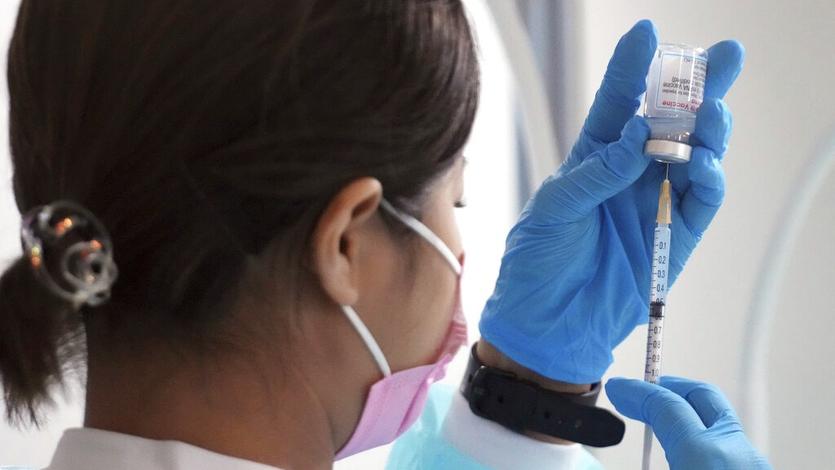 In this file photo dated June 30, 2021, a health worker prepare a dose of the Moderna COVID-19 vaccine at Sumida ward of Tokyo. (EUGENE HOSHIKO / FILE / AP)
In this file photo dated June 30, 2021, a health worker prepare a dose of the Moderna COVID-19 vaccine at Sumida ward of Tokyo. (EUGENE HOSHIKO / FILE / AP)
Separately, Japan fully lifted the COVID-19 state of emergency covering Tokyo and another 18 prefectures, as well as the quasi-state of emergency covering other regions on Friday as scheduled.
It is the first time since April 4 that none of Japan's 47 prefectures is under either a state of emergency or a quasi-state of emergency.
The Japanese government plans to ease restrictions in phases to resume social and economic activities while preventing another wave of coronavirus infections.
With the state of emergency being gradually lifted, the tourism sector saw a rise in reservations for domestic tours, and businesses such as restaurants and theme parks were preparing for an expected increase in customers.
Laos
The Lao government on Thursday announced an extension of COVID-19 restrictive measures for a further two weeks as cases continued to increase.
Deputy Head of the Prime Minister's Office Thipphakone Chanthavongsa told a press conference in the Lao capital Vientiane that the government is making every effort to lower the rate of infection and death in the country.
The COVID-19 restrictive measures will remain in place until Oct 15.
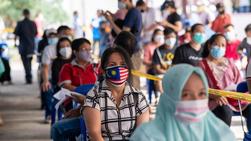 People wait to receive COVID-19 vaccines in Klang, Selongor, Malaysia, Sept 12, 2021. (CHONG VOON CHUNG / XINHUA)
People wait to receive COVID-19 vaccines in Klang, Selongor, Malaysia, Sept 12, 2021. (CHONG VOON CHUNG / XINHUA)
Malaysia
Malaysian regulators on Friday announced the conditional approval for use of the CoronaVac COVID-19 vaccine developed by the Chinese pharmaceutical company Sinovac Biotech for those aged 12-17.
Health Ministry Director-General Noor Hisham Abdullah said in a statement the country's drug control authority has agreed for the use of the CoronaVac vaccines for the age group.
However, the use of the vaccines is prioritized for those without health problems and comorbidities, pending further study.
In another development, Malaysia recorded 9,671 deaths due to COVID-19 in September, the deadliest month since the pandemic began, government data showed on Friday, though authorities have said the increase was mostly due to the delayed inclusion of fatalities from previous months.
The spike has pushed Malaysia's death toll to among the highest per capita in Asia, even as new infections have slowed in recent weeks amid a ramped-up vaccination program.
September's figure accounted for more than a third of the 26,335 total COVID-19 deaths reported in Malaysia, which has recorded over 2.2 million infections, the third-highest number in Southeast Asia.
ALSO READ: M'sia pulls ahead in vaccinations with Chinese supplies, cooperation
Mongolia
Mongolia's COVID-19 tally rose to 306,603 after 2,519 more local infections were registered over the past 24 hours, the country's health ministry said Friday.
Meanwhile, 18 more COVID-19 patients aged over 20 died in the past day, bringing the national tally to 1,222, the ministry said in a statement.
In addition, there are now more than 86,000 active COVID-19 cases in the country, and most of them are receiving home-based care due to a shortage of hospital beds and medical staff, according to the ministry.
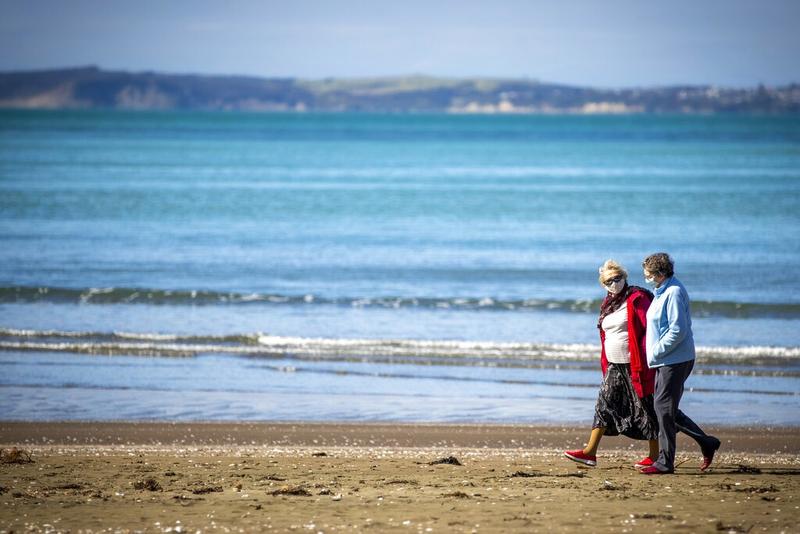 People wearing face masks walk along a beach in Auckland, New Zealand on Aug 25, 2021. (MICHAEL CRAIG / NEW ZEALAND HERALD VIA AP)
People wearing face masks walk along a beach in Auckland, New Zealand on Aug 25, 2021. (MICHAEL CRAIG / NEW ZEALAND HERALD VIA AP)
New Zealand
New Zealand logged 19 more cases of the highly infectious Delta coronavirus variant on Friday - all in Auckland, making it highly likely that the country's biggest city will continue to be sealed off even if some restrictions are eased next week.
Prime Minister Jacinda Ardern enforced what was meant to be a "short and sharp" nationwide lockdown nationwide in mid-August after the Delta outbreak. But while the rest of the country has largely returned to normal life, Auckland's population of 1.7 million has now been in lockdown for about seven weeks.
Ardern will decide on Monday whether she will ease the restrictions in Auckland but has warned that border rules preventing travel to and from the city are likely to remain in place.
Recent daily case numbers have ranged between 8 and 45 and Deputy Prime Minister Grant Robertson described the relatively stable numbers as encouraging.
"But we must not be complacent," he said, urging more Aucklanders to get tested over the weekend. Health authorities have said more cases are expected in the coming days.
Palestine
Palestine on Thursday extended the state of emergency to prevent the spread of the COVID-19, mainly Delta variant, in the Palestinian territories.
In a decree issued by Palestinian President Mahmoud Abbas, the state of emergency was extended effective immediately so as to give the government enough power to combat the spread of COVID-19 in Palestine.
The state of emergency was first issued in March last year after the discovery of the first cases of coronavirus in the Palestinian territories and has been extended or re-declared every month since then.
Extending the state of emergency in Palestine came after the Palestinian Ministry of Health recorded 18 fatalities and 1,461 new COVID-19 cases in the West Bank and Gaza Strip in the last 24 hours.
The virus has claimed so far the lives of 4,366 people in the Palestinian territories since March 2020.
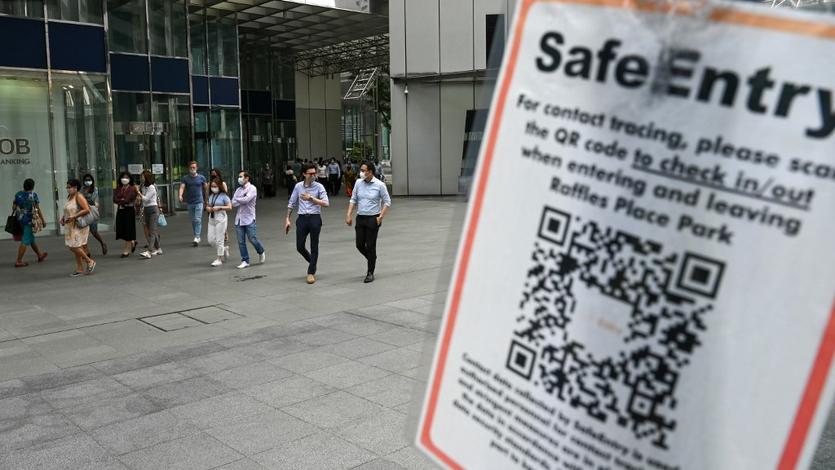 A coronavirus contact tracing sign is pictured as people walk out during lunch break at the Raffles Place financial business district in Singapore on Sept 14, 2021. (ROSLAN RAHMAN / AFP
A coronavirus contact tracing sign is pictured as people walk out during lunch break at the Raffles Place financial business district in Singapore on Sept 14, 2021. (ROSLAN RAHMAN / AFP
Singapore
Singapore's reimposition of coronavirus restrictions to buy time to prepare to live with the disease has been met with some rare frustration as the government walks a fine line between reopening and preventing hospitals from getting overwhelmed.
Singapore has largely kept the virus at bay since last year with masks, contact tracing and a closed border.
Now infections are surging to new daily records of more than 2,000 but with 82 percent of its 5.4 million people fully vaccinated, 98.1 percent of cases over the past month have been asymptomatic or involved only mild symptoms.
Singapore relaxed restrictions in August, after 18 months of largely successful mitigation efforts, with a plan for more easing after reaching the 80 percent vaccination target in early September.
But instead, with the Delta variant spreading, the reimposition of restrictions, with dining out and other social interactions limited to groups of just two people, has dashed hopes.
The government has said the tighter measures are "temporary breaks" needed to buy time to expand healthcare capacity, set up more isolation facilities, reach more of the unvaccinated and get booster shots to those who need them.
About 300 ICU beds can be readied at short notice. As of Thursday, 34 cases were in intensive care but a wave of unvaccinated people getting seriously sick could swamp the health system.
Despite the risks, the government's message is that in order to open up, Singapore has to learn to live with much higher rates of COVID-19 than it has become used to.
"We are not going back to a scenario of low daily cases anymore," Finance Minister Lawrence Wong said recently.
"It is not going to be possible, because we are moving forward to learn to live with the virus and we are continuing with our reopening plans."

People wearing face masks to help curb the spread of the coronavirus ride an escalator in Seoul, South Korea on Sept 29, 2021. (LEE JIN-MAN / AP)
South Korea
South Korea extended social distancing curbs to combat the coronavirus pandemic on Friday for two weeks, offering more incentives to people to get vaccinated as it battles thousands of new cases each day, particularly in the capital.
The rapid resurgence in the greater Seoul area prompted authorities to extend distancing restrictions until Oct 17, including a ban in the region on dining out after 10 p.m. and gatherings of more than two people after 6 pm.
The country recorded 2,486 new COVID-19 cases on Thursday, according to the Korea Disease Control and Prevention Agency (KDCA), with the daily tally having topped 3,000 for the first time last week.
The daily average exceeded 2,635 over the past week - the highest-ever level and easily more than twice the level a month before, the KDCA said.
The capital Seoul and neighbouring regions remain the hotspot, reporting almost 2,000 cases every day for the last week, up about 42 percent within just one week.
"We're in a very dangerous situation where the virus is spreading surrounding the Seoul metropolitan area," said Lee Ki-il, deputy minister of health care policy, speaking during a briefing.
The upcoming two weeks is an important period as the government is revamping its anti-virus policy to facilitate a phased return to normal activities starting November, he added.
Sri Lanka
Sri Lankan authorities on Friday lifted a nationwide quarantine curfew after 42 days, but imposed strict health guidelines including a ban on public gatherings and allowing people to leave their houses only for essential work.
According to the Health Ministry, the new health guidelines would be imposed strictly to avoid another wave of COVID-19, which has infected over 517,000 people and caused 12,906 deaths.
The guidelines include a complete ban on all types of public gatherings, including parties, events and religious festivals, as well as allowing people to leave their homes only for employment, medical purposes, and essential work.
State Minister of Transport Dilum Amunugama said Thursday inter-province train services and bus services will also continue to be suspended for another two weeks till permission is granted by health workers.
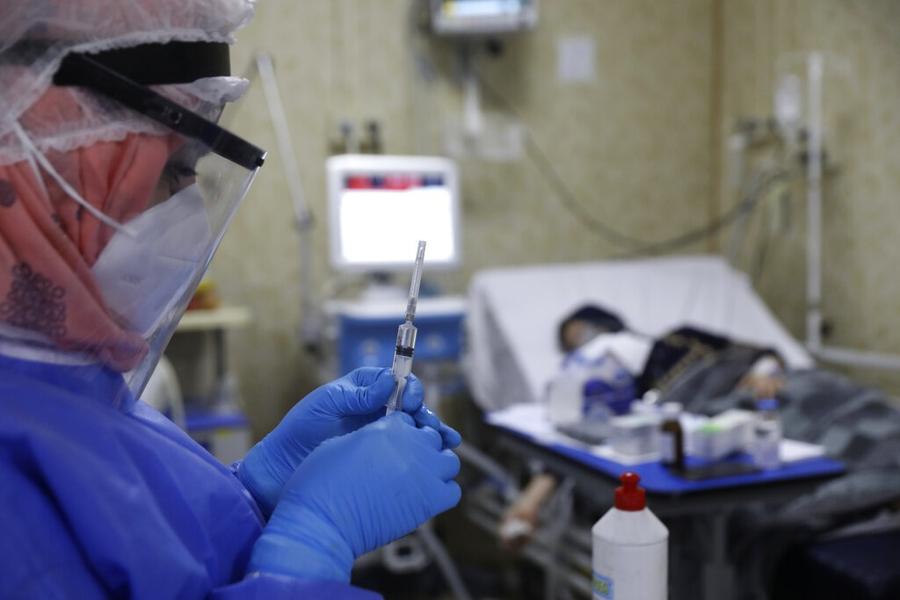 A nurse prepares a syringe for a patient infected with the coronavirus in the intensive care unit at the Syrian American Medical Society Hospital, in the city of Idlib, northwest Syria on Sept 20, 2021. (GHAITH ALSAYED / AP)
A nurse prepares a syringe for a patient infected with the coronavirus in the intensive care unit at the Syrian American Medical Society Hospital, in the city of Idlib, northwest Syria on Sept 20, 2021. (GHAITH ALSAYED / AP)
Syria
In both the Syrian capital Damascus and parts of the country that have rebelled against its rule during a decade of war, people are facing the same enemy: COVID-19.
Intensive care beds have filled up at hospitals across the fractured nation this month because of a COVID-19 surge, piling pressure on health systems shattered by conflict and amid slow vaccination campaigns.
"There are many cases that need intensive care and unfortunately often we either have to wait for a patient to be moved from the wing, or to die so another can replace them," said Absi Mohamad Fouad, a doctor at a hospital in Idlib in the rebel-held northwest.
Some 4 million people live in the northwest, 1.7 million of them in camps for those uprooted by the conflict.
"The hospitals can no longer absorb this attack," Fouad added, saying that younger people were being hit harder by this wave. All 70 beds were in use at his hospital and there was an oxygen shortage, he said.
More than 1,000 cases a day are being recorded in the northwest, often up to 1,500, said Mark Cutts, UN deputy regional humanitarian coordinator for the Syria crisis.
But with testing kits in short supply, the real figure could be a lot higher, he said.
"It's a disastrous situation. The hospitals are completely overwhelmed. People are dying because of a lack of oxygen," he said. Less than 2 percent of people in the northwest have been vaccinated.
Vaccination campaigns have made slow progress more widely in Syria, where the overall population stands at around 18 million.
In the northwest, some 117,000 people have received a shot, according to local health authorities. The government's campaign has vaccinated some 450,000 people.
At a Damascus hospital this week, medics in disposable gowns and face masks tended to patients hooked up to oxygen.
The situation was so bad at one point that patients were sent to Homs for treatment, said Tawfik Hasaba, head of the Syrian ambulance service. "Today one of the infected patients who needed care was transported to Hama." Homs is about 140km from Damascus, and Hama 180km.
ALSO READ: Vietnam gets pandemic relief
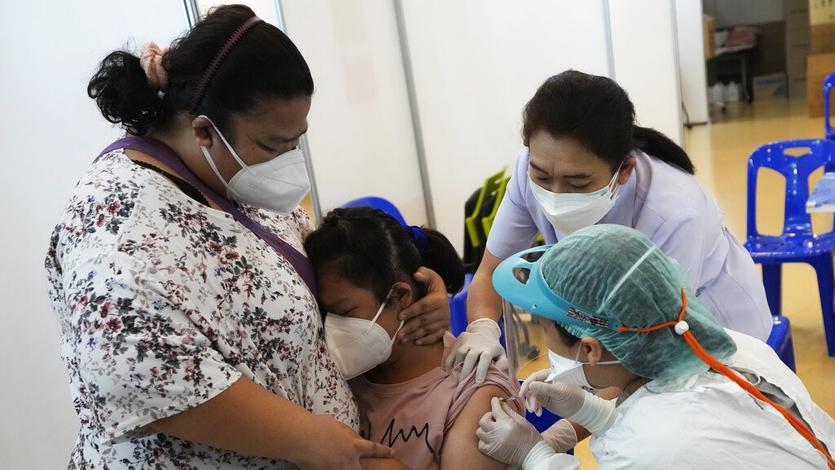 A mother comforts her child receiving the Pfizer-BioNTech COVID-19 vaccine at a hospital in Bangkok, Thailand on Sept 21, 2021. (SAKCHAI LALIT / AP)
A mother comforts her child receiving the Pfizer-BioNTech COVID-19 vaccine at a hospital in Bangkok, Thailand on Sept 21, 2021. (SAKCHAI LALIT / AP)
Thailand
Thailand has eased some COVID-19 restrictive measures, shortened night-time curfews and reduced the mandatory quarantine period for incoming fully-vaccinated visitors to seven days.
Starting on Friday, massage parlors, sports stadiums, theaters and zoos in the capital Bangkok are allowed to reopen with certain pandemic control requirements.
Shopping malls, convenient stores and a number of other establishment are allowed to operate for longer business hours in the city.
In 28 other provinces which have been under maximum control along with Bangkok, restrictions have also been eased, with the nighttime curfews being shortened by one hour.
Meanwhile, visitors arriving in Thailand and have not been fully-vaccinated are subject to a 10-day quarantine period starting from Friday.
Restrictions were also eased in Phuket, where fully-vaccinated visitors will only need to stay in the resort island for seven days before heading to other parts of Thailand.
Thailand on Friday reported 11,754 new COVID-19 cases and 123 more deaths, according to the Center for COVID-19 Situation Administration (CCSA).
The country has administered about 53.7 million doses of vaccines, with more than 28 percent of its nearly 70 million population having been fully vaccinated, according to the CCSA.
The Philippines
The Philippines further loosened coronavirus restrictions in the capital region on Friday, allowing restaurants to accept more guests and gyms to reopen after recording a decline in daily COVID-19 cases.
The Philippines, which is battling one of the worst COVID-19 outbreaks in Asia, is gradually relaxing curbs to allow the recovery of the economy.
An alert level system first and small-scale lockdown system imposed on the capital region on Sept 16 to allow for greater mobility and more businesses to reopen will remain in place up to Oct 15.
Restaurants and personal care services were permitted to double their allowable operating capacity to 20 percent, while fitness studios and gyms were allowed to reopen their doors, but only to fully vaccinated clients.
The capital region, an urban sprawl of 16 cities that is home to 13 million people, is the country's coronavirus epicenter, accounting for a third of confirmed infections and one in every four deaths. Nearly four-fifths of the area's population have already been fully vaccinated against COVID-19, government data showed.
Meanwhile, China delivered another batch of Sinovac’s CoronaVac vaccines on Friday to the Philippines to support the country's COVID-19 vaccination campaign.
The Philippines has administered over 45.1 million doses of COVID-19 vaccines, and more than 21.1 million people have been fully vaccinated so far.
To date, the Philippines has reported more than 2.5 million confirmed COVID-19 cases, including 38,493 deaths.
Turkey
Turkey on Thursday reported 29,104 new COVID-19 cases, raising the tally of infections to 7,154,070.
The death toll from the virus in Turkey rose by 216 to 64,054, while 32,119 more people recovered in the last 24 hours, according to the Turkish Health Ministry.
Vietnam
Vietnam reported 6,957 new COVID-19 cases on Friday, including 6,941 locally transmitted one and 16 imported, according to the country's Ministry of Health.
The new infections brought the country's tally to 797,712 with 19,437 deaths, the ministry said.
As many as 636,081 patients have so far recovered, up 27,250 from Thursday, while nearly 42.9 million doses of COVID-19 vaccines have been administered nationwide, according to the ministry.


